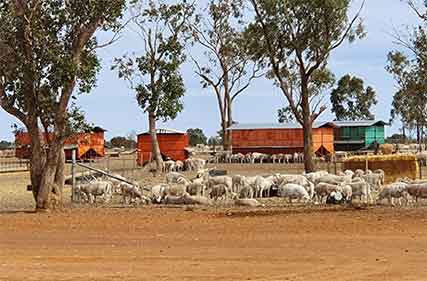
The containment pens were the “backstop” if natural pastures are not available and weather conditions don’t allow the growth of forage crops like oats.
St George White Dorper producer Jeff Betts is not afraid to implement change – even when battling the extremities of Mother Nature.
Together with wife Wendy, the couple breed White Dorpers on 12,000 hectares in a 500mm summer dominant rainfall environment at St George, southern Queensland.
While accustomed to drier conditions, a horrific drought in the region which started in 2013 prompted the couple to rethink their management approach and shift from a six-month to eight-month breeding program for their ewes.
“We initially operated a six-month breeding program on our White Dorpers,” said Mr Betts, who was a fifth generation Merino producer before transitioning to White Dorpers in 2005.
“In an average or better than average season the six-month program works a lot better as opposed to dry times.
“We were progressing nicely until a horrific drought from around 2013 through to early 2020.
“That made us sit back and reflect on where we were at.
“We made the decision to give an eight-month joining program a go to alleviate our workload.”
Mr Betts said an accelerated breeding program provided productivity gains.
The couple just completed scanning 7,000 ewes, with 92 per cent pregnant, including maidens.
While the comparison with scanning results under the six-month program is difficult due to numbers being skewed as a result of the drought conditions, Mr Betts is confident the change is paying dividends where it matters most – increased profits.
“When it gets dry in our environment it’s tough, but I feel that if you are below a normal season the eight-month program is ideal,” Mr Betts said.
“If we can guarantee reasonable seasons, I think there is a lot of room to move for a six-month program.
“An accelerated program tends to weed out less fertile animals.
“Providing you have a self-replacing flock and you can replace the numbers you turn off, the numbers stack up.”
As part of the management change, the Betts added containment pens, an addition that has proved to be a “game changer” for their operation.
While they currently sit idle due to a return to normal seasonal conditions, Mr Betts is a huge champion of the containment pens and its role in helping the operation remain viable during drought.
Mr Betts said the containment pens were the “backstop” if natural pastures are not available and weather conditions don’t allow the growth of forage crops like oats.
“When things turned dry we needed to work out what to do with the younger sheep that didn’t have good pasture,” Mr Betts said.
“We ended up with a containment pens for dry weather management.
“It’s been a game changer for us in the fact that in a drought we have been able to generate a profit.
“It allows you to sell a product in top order when the meatworks and restockers are struggling to find animals in good condition in a drought.”
While the Betts broke new ground in the region as the first Dorper producers to implement an accelerated breeding program, it wasn’t without challenges and lessons – which they are only too happy to share.
“The accelerated joining practice is becoming very popular in the district,” Mr Betts said.
“We were the first cab off the rank and made a lot of mistakes, but we are always happy to provide advice to any young farmers or newcomers to the industry on what doesn’t work.
“One of the difficult things is to ride out the poor seasons.”
“That’s where the containment pens help. You can hold the sheep on-farm until it rains and they don’t go backwards.
“It gives us the option of retaining the ewe as long as possible. If it rains they can be joined, if it doesn’t they can be sold in reasonable condition. It also saves land and pasture degradation in a drought.”
-Dorper Sheep Society
